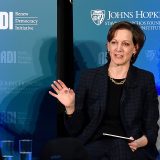We have promoted democracy in our movies and books. We speak of democracy in our speeches and lectures. We even sing about democracy, from sea to shining sea, in our national songs. We have entire government bureaus devoted to thinking about how we can help other countries become and remain democratic. We fund institutions that do the same.
And yet by far the most important weapon that the United States of America has ever wielded—in defense of democracy, in defense of political liberty, in defense of universal rights, in defense of the rule of law—was the power of example. In the end, it wasn’t our words, our songs, our diplomacy, or even our money or our military power that mattered. It was rather the things we had achieved: the two and a half centuries of peaceful transitions of power, the slow but massive expansion of the franchise, and the long, seemingly solid traditions of civilized debate.
In 1945, the nations of what had been Nazi-occupied Western Europe chose to become democracies, partly because they aspired to resemble their liberators. In 1989, the nations of what had been Communist-occupied Eastern Europe also chose to become democracies, partly because they too wanted to join the great, prosperous, freedom-loving, American-led democratic alliance. A huge variety of countries all across Asia, Africa, and South America have also chosen democracy over the past several decades, at least partly because they wanted to be like us, because they saw a path to the peaceful resolution of conflict in imitating us, because they saw a way to resolve their own disputes just like we did, using elections and debate instead of violence.

